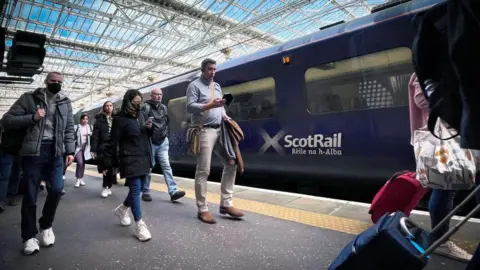ScotRail fares set to increase by nearly 4%
 PA Media
PA MediaRail fares across Scotland are set to increase by 3.8% in April.
The price rise, instigated by Transport Scotland, will affect all services operated by ScotRail. It means an anytime return ticket between Glasgow and Edinburgh will rise by £1.20 - from £31.40 to £32.60.
Transport Scotland said Scottish government ministers agreed on the increase - which follows an 8.7% rise last year - after "lengthy consideration" to ensure rail services are sustainable long-term and in line with the budget.
Opposition parties said the price rise would "hammer" passengers who would be "dismayed" at having to pay more despite regular disruption to rail services.
Transport Scotland said a 20% discount on season tickets would continue until September and the travel card Flexipass - which offers 12 single journeys for the price of 10 - has been expanded to cover more stations.
These include Exhibition Centre (Glasgow), Anderston, Motherwell, High Street (Glasgow), Charing Cross (Glasgow), Perth, Stirling, and Bathgate.
Transport Secretary Fiona Hyslop said: "We know that any increase is unwelcome for passengers, therefore we have kept the rise as low as possible to maintain the attractiveness and affordability of rail as a travel option.
"We continue to look at ways to encourage greater rail use and that is why we are continuing our 20% discounts on season tickets until September 2025 as planned and expanding the availability of Flexipass.
"ScotRail also continue to develop fares initiatives which can help attract more passengers, while offering savings and added value to existing rail users."
'Painful fare hikes'
Scottish Labour's transport spokeswoman Claire Baker said the price increase would "hammer" rail passengers and "consign ScotRail to a spiral of decline".
She added: "The SNP should be making rail more affordable, but instead it has hit passengers with painful fare hikes time and time again.
"This increase is bad for Scotland's rail passengers, bad for our economy and bad for the environment."
Sue Webber, transport spokeswoman for the Scottish Conservatives, said: "Nicola Sturgeon promised a bright new future for Scotland's railways when nationalising it almost three years ago, but the exact opposite has happened.
"Passengers will be dismayed they will have to fork out even more in the coming months for services that are frequently cancelled and delayed."
The Scottish Liberal Democrats urged the government to keep costs down and give passengers more flexibility.
The party's transport spokesman Daniel O'Malley called for more railway lines in areas with poor transport links.
"Scotland needs a cheap, reliable and frequent rail service - it's a win-win for passengers and the planet," he said.
The Scottish Greens' transport spokesman Mark Ruskell said rail travel needed to be "affordable and accessible" in order for people to choose it over cars.
He added: "When the Scottish Greens were in government we secured the removal of peak rail fares, only for the SNP to bring them back as soon as we were out of the room.
"If we want safer and cleaner communities and less cars on our roads, then we need to cut the cost of public transport."
In October 2023, ScotRail launched a pilot scheme which scrapped peak rail fares to encourage people to use the railway rather than their cars, but it ended in September 2024 following "limited success".
Peak fares cover tickets bought before 09:15 on weekdays and certain services between 16:42 and 18:30.
Transport Scotland said the scheme, which saw ticket prices subsidised by the Scottish government and standardised across the day, "did not achieve its aims" of persuading more people to swap car journeys for rail travel.
Passenger levels increased by a maximum of around 6.8% but the scheme required a 10% rise to be self-financing.
The move to scrap the scheme was criticised by opposition MSPs, with Labour calling peak fares "a tax on workers trying to travel to work in a more sustainable way".
